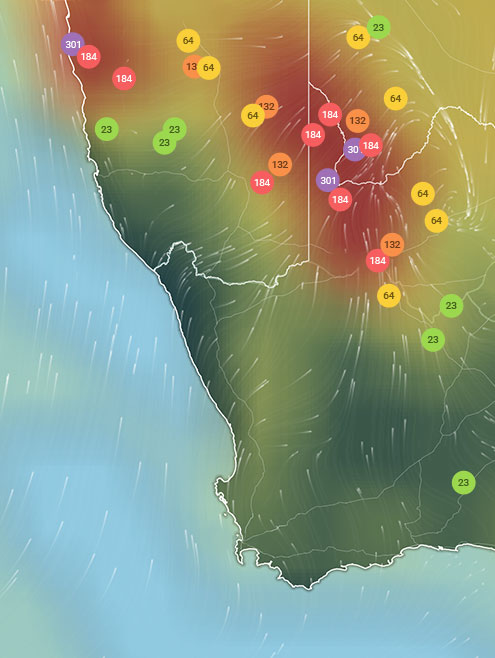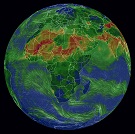Get a monitor and contributor to air quality data in your city.
81.2K people follow this city






AIR QUALITY DATA CONTRIBUTORS
Find out more about contributors and data sources| Weather | Clear sky |
| Temperature | 98.6°F |
| Humidity | 58% |
| Wind | 12.2 mp/h |
| Pressure | 29.8 Hg |
| # | city | US AQI |
|---|---|---|
| 1 | Chiang Mai, Chiang Mai | 158 |
| 2 | Doi Saket, Chiang Mai | 156 |
| 3 | Sam Phran, Nakhon Pathom | 155 |
| 4 | Mae Mo, Lampang | 154 |
| 5 | San Sai, Chiang Mai | 154 |
| 6 | Chiang Rai, Chiang Rai | 151 |
| 7 | Mae On, Chiang Mai | 150 |
| 8 | Hua Hin, Prachuap Khiri Khan | 119 |
| 9 | Cha-am, Phetchaburi | 104 |
| 10 | Bang Kruai, Nonthaburi | 101 |
(local time)
SEE WORLD AQI RANKING
| # | station | US AQI |
|---|---|---|
| 1 | Royal Varuna Yacht Club | 76 |
| 2 | HT | 65 |
| 3 | ECO HOTEL - Thammasat | 61 |
| 4 | Rugby School Thailand | 59 |
| 5 | Royal Park Village | 57 |
| 6 | International School of Chonburi | 53 |
(local time)
SEE WORLD AQI RANKINGUS AQI
60
live AQI index
Moderate
| Air pollution level | Air quality index | Main pollutant |
|---|---|---|
| Moderate | 60 US AQI | PM2.5 |
| Pollutants | Concentration | |
|---|---|---|
| PM2.5 | 16.5µg/m³ | |
PM2.5
x3.3
PM2.5 concentration in Bang Lamung is currently 3.3 times the WHO annual air quality guideline value
| Sensitive groups should reduce outdoor exercise | |
| Close your windows to avoid dirty outdoor air GET A MONITOR | |
| Sensitive groups should wear a mask outdoors GET A MASK | |
| Sensitive groups should run an air purifier GET AN AIR PURIFIER |
| Day | Pollution level | Weather | Temperature | Wind |
|---|---|---|---|---|
| Wednesday, Apr 24 | Good 39 AQI US | 91.4° 80.6° | ||
| Thursday, Apr 25 | Good 37 AQI US | 93.2° 80.6° | ||
| Friday, Apr 26 | Good 36 AQI US | 93.2° 80.6° | ||
| Today | Moderate 60 AQI US | 98.6° 82.4° | ||
| Sunday, Apr 28 | Good 45 AQI US | 95° 82.4° | ||
| Monday, Apr 29 | Moderate 51 AQI US | 95° 82.4° | ||
| Tuesday, Apr 30 | Moderate 59 AQI US | 95° 84.2° | ||
| Wednesday, May 1 | Moderate 64 AQI US | 93.2° 82.4° | ||
| Thursday, May 2 | Moderate 60 AQI US | 93.2° 82.4° | ||
| Friday, May 3 | Moderate 57 AQI US | 93.2° 84.2° |
Interested in hourly forecast? Get the app
Bang Lamung is located in the southern portion of Chonburi province, which itself is located within the eastern region of Thailand. Observing both current and records of air pollution present within Bang Lamung, it can be seen that whilst there are periods in which the air quality shows significant improvement and achieves the World Health Organization's (WHO's) target goal for the best level of air quality at 10 μg/m³ or less, it still stands to reason that a majority of the months on record over 2020 show highly elevated readings of PM2.5, despite nationwide lockdowns due to the covid-19 pandemic. PM2.5 is one of the most dangerous forms of pollutants that can be found in the air throughout Bang Lamung and Thailand, consisting of many materials that are 2.5 micrometers or less in diameter, sometimes going down to sizes many times smaller. Due to this extremely small size, it can easily bypass the body's defense systems and penetrate deep into the tissue of the lungs, causing damage, with further elaboration on this damage being discussed later in the article. Because of its prominence as a pollutant, PM2.5 is also one of the main units used in recording air quality levels, particularly for years past. Readings from 2020 will be discussed in their PM2.5 figures, which came in significantly elevated over several months of the year.
US AQI is also another prominent measure of air pollution, a number aggregated from the various main pollutants typically found in the air. These include sulfur dioxide, carbon monoxide, nitrogen dioxide and the two main forms of particle pollution, which includes the aforementioned PM2.5, as well as its larger counterpart, PM10, which is typically associated with larger or more coarse materials that can pollute the air (sand, certain molds and other larger dust particles). In mid-September of 2021, Bang Lamung was seen with a US AQI reading of just 4, an extremely clean reading that would place it within the 'good' air quality rating bracket, which requires a US AQI reading of 0 to 50 to be classified as such and represents the best level of air cleanliness, particularly when it moves closer to 0. PM2.5 readings taken in 2020 indicate that September is one of the cleaner months of the year, and as such, whilst this represents an extremely respectable level of air quality, pollution spikes can and will suddenly occur, particularly at certain times of the year (with these months also being discussed in further detail later on in the article). As such, preventative measures should be employed to keep the more detrimental or harmful side effects of excessive pollution exposure at bay. Air pollution levels should also be monitored so that individuals can get a better idea of when there may be more prominent bouts of air pollution occurring within Bang Lamung. These forecasts and readings can be followed via the maps, graphs and forecasts available on this page, as well as on the AirVisual app. In closing, Bang Lamung has shown to have great levels of air cleanliness during certain times of the year, but can also rise suddenly to far more hazardous levels.
The main causes of air pollution in Bang Lamung stem from ones that are seen throughout many regions of Thailand, which includes the open burning of certain crop fields or other areas of vegetation. Whilst this is certainly more prevalent in the northern regions of the country, the fallout from these practices can also occur in many other provinces of Thailand, with the smoke from fires being able to drift many miles from their source, causing air pollution spikes in cities and provinces great distances away. Other causes of pollution are also a significant contributing factor, as air pollution in Chon Buri and much of Thailand does not stem solely from the burning of vast swathes of organic matter (although it is one of the more aggressive contributors). The combustion of fuels in vehicle engines is another constant source of air pollution, especially when these vehicles are of the aged or poor quality variety, which is still highly prevalent in many areas of the province. The poor combustion process allows for far more noxious oil vapors to be released, as well as larger amounts of chemical compounds and hazardous particulate matter. Other sources include dust from construction sites, road repairs and even the destruction and tearing down of older buildings, showing just how widespread particle pollution can be.
Health issues that can arise as a result of prolonged or acute pollution exposure in Bang Lamung include cases of coughing and infections of the respiratory tract. Skin conditions may also present themselves, particularly in individuals who have a sensitive disposition towards certain chemicals or particles (as many of them having properties that make them irritating to mucous membranes or even exposed skin. More serious health conditions include those that fall under the chronic obstructive pulmonary disease (COPD) bracket, which are ones such as emphysema and pneumonia, as well as increased risk of cancer, heart attacks, strokes and premature death, all of which have a significant correlation with pollution exposure.
Observing the air quality records taken over the year of 2020, it can be seen that the most polluted months of the year were January through to April, as well as November and December. This indicates a commonly seen pattern in Thailand whereby the pollution levels rise significantly at the end of the year and continue to stay elevated well into the following year. Out of all the above-mentioned months, January and February had the most hazardous readings at 49.5 μg/m³ and 48.5 μg/m³ of PM2.5 respectively.
Despite having eight months of the year come in ranked as 'moderate' or above in regards to PM2.5 ratings, the months of June through to September had the most optimal readings of air quality, all coming in within either the 'good' air quality bracket or WHO's target goal. Their respective readings were 7.9 μg/m³, 8.6 μg/m³, 10.2 μg/m³ and 8.8 μg/m³, making June the cleanest month of the year and indicating a time in which the air would be freest from contaminating clouds of smoke, haze and other chemical compounds of fine particles.
6Contributors
3 Educational Contributors

1 station

1 station

1 station
3 Individual Contributors

1 station
1 station
1 station
1 Data source